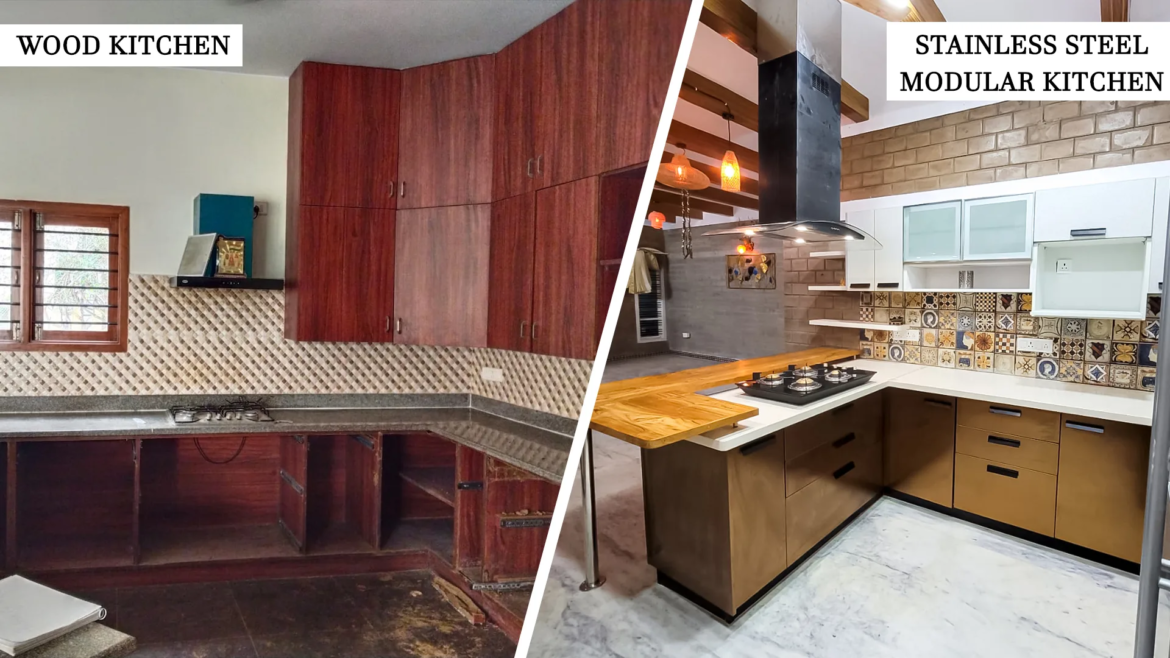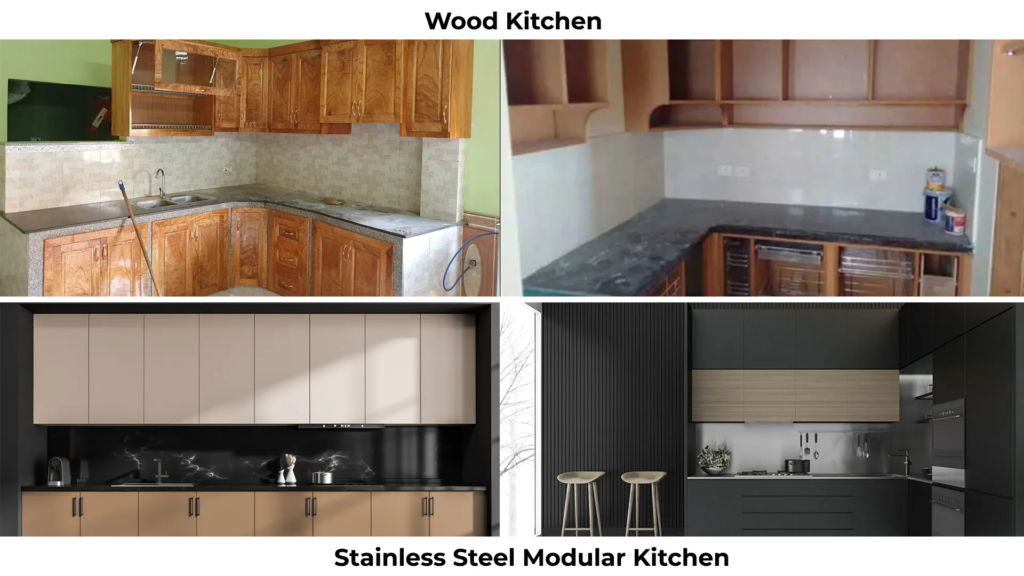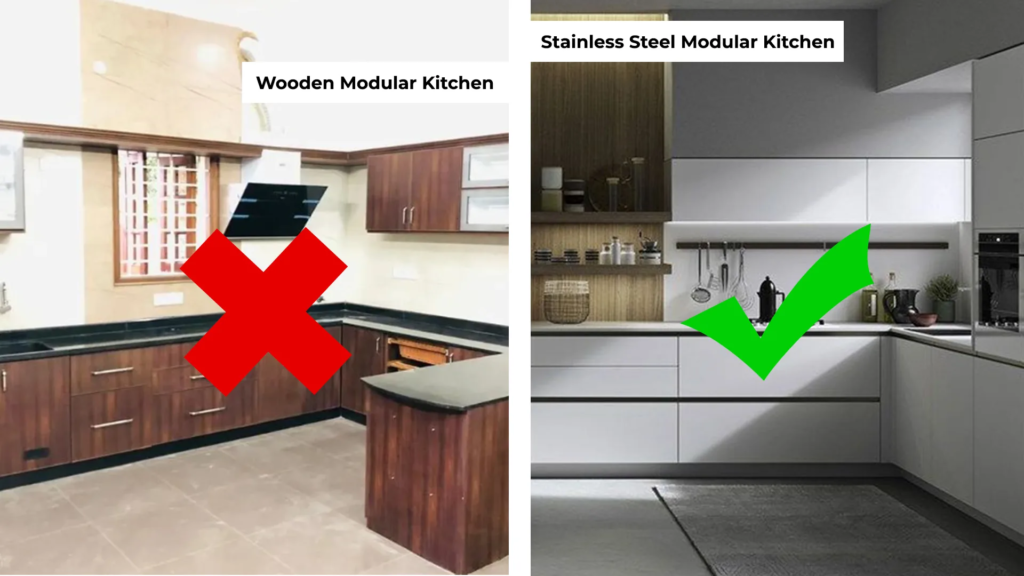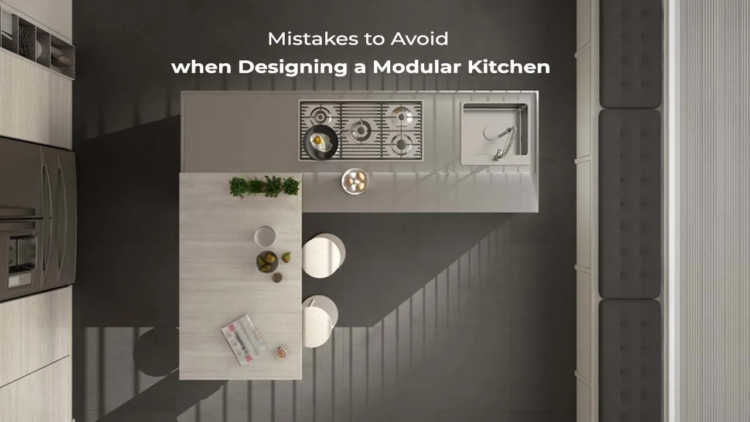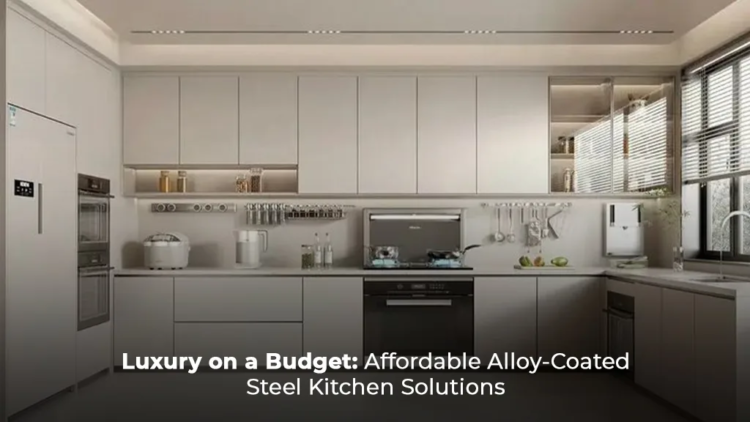Modular Kitchens have become the point of focus for Indian households,
The best modular kitchens would be the ones that are well thought out for the need of the Household and the person cooking in particular.
Factors that determine in the long run apart from the aesthetic looks would be the convenience of Preparation of Ingredients, cooking, cleaning & Storage, and in the long run that is Hygienic and safe.
A peek into the factors of the raw materials is as follows which are basically wood and wood Composites and the use of Metal.
Particle Board, Medium Density fiberboard, and of late Plywood with decorative laminates are the maximum used as the availability with the advertisements tempts the usage, moreover, an average Carpenter completes the task of buying all the raw materials and processes the modular kitchen installation.
The point to ponder is how the raw materials used which are basically wood which is safe, however, the resins that are used to manufacture these wood composites are highly toxic in the long run to any living being.
For instance, apart from the wood the resins, solvents, and adhesives used are all Inorganic chemicals for binding such as Phenol Formal Dehyde, and Ammonia based Adhesives that emit gases that deposit either on the utensils or the food that is stored, Laminates especially are the decorative sheet that is pasted on plywood with Ammonia based adhesive which one can smell for a long time after the installation, the laminate is basically Ethyl cellulose paper which is printed on Gravure machines with water-based Inks for the design or Colour and later on is dipped in Urea Formal Dehyde for either the gloss finish or the matt, one could browse the WEB to check these factors for reality checks which frighteningly reveals the toxicity of these modern-day advertised materials are made of and not even a warning symbol is displayed. The use of Biodegradable wood containing cellulose attracts domestic pests, Termites & Borer that cause irreparable damage and result in total ruin over a period of time.
The use of inert metal which does not degrade with the weather or certainly does not emit fumes is preferable to these wood composites least to say.
Stainless steel which is used in Food processing units, Confectionaries, Dairies, Hotels, and related industries use only stainless steel as it lasts long, is hygienic, and is easy to clean and disinfect Plain soap and warm water could be used after use.
The use of Stainless Steel or steel composites for modular kitchens are the best suited as an alternative to the wood modular kitchen as almost 70% of the plywood used is for the cabinetry.
Stainless Steel when used for the Cabinets especially would be the best alternative, which would prove to be a bit expensive. There are alternate metals where the Mild steel is coated with certain alloys of Zinc, Magnesium, and Aluminum which are Modular and can be the best choice and robust to last at least for a period of 25 Years making the Interior area of the cabinets emission-less, free of pests and is washable periodically.
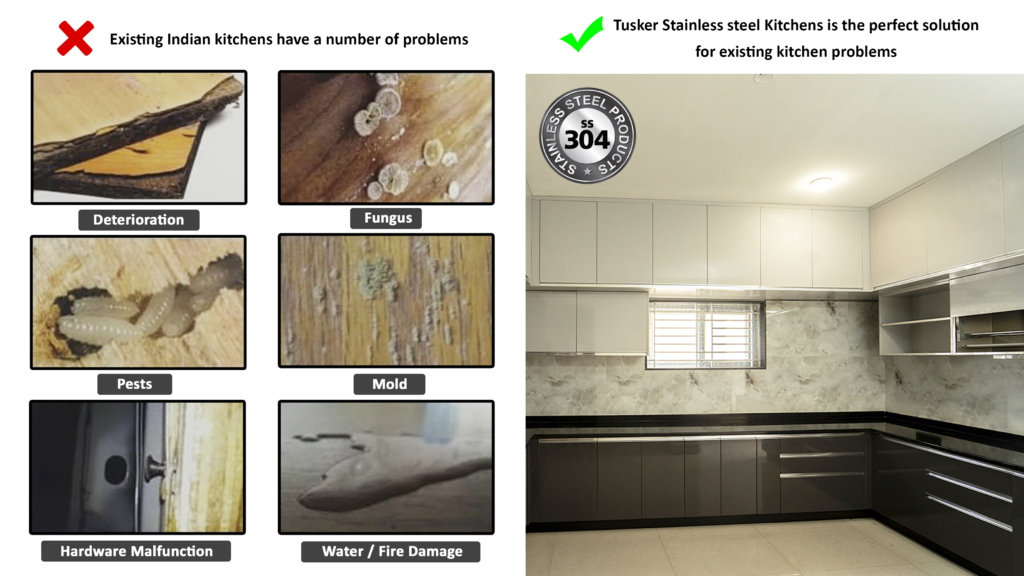
Aesthetic Design Options
The Design aspects in the exterior of the cabinets can all be of any choice which is open to air like Plywood, Granite, or such other factors which go with the aesthetics.
Cost & Budget
The cost of a Stainless steel 304 Grade modular kitchen would be higher and if the Kitchen is for use nearer to a Coastline or a humid area it’s preferable to use Stainless Steel Cabinetry.
However, Alloy Coated Steel could be used which for the Cabinetry would be the same cost as Plywood with Laminates, thereafter any material of choice could be used with minimal Plywood
Longevity
Stainless Steel Modular Kitchen lasts forever unlike Biodegradable wood however Alloy coated steel is sure to last for 20 to 25 years with a bit of care.
Wear & Tear
Very minimal with Stainless Steel modular Kitchen cabinetry due to its properties, Wear, and tear happens with the wood composites which will require attention in a few years
Pests
Pests inhibit the dark spaces, especially inside the cabinets and the crevices, they make a cozy home and dwell with the residue of food and also the cellulose from the wood.
Borers and termites are menacing and will chew away the entire wood endlessly.
Pests are more likely to inhabit steel.
Heat & Liquids
Heat and Liquids accelerate the deformation of wood and wood composites and are combustible which make it dangerous.
Metal absorbs heat and dissipates and is water-repellant and lasts over a period of time.
Peeling, Chipping & Bending
Laminates fade and peel off which cannot be stuck again, once a portion of the plywood chips off it cannot be stuck again, chances of laminate forming bubbles are very high when the tack of the adhesive goes down or chances are that the emission of the Plywood and the adhesive forces the Laminate to form a bubble which is disturbing to look.
Metal can always be painted and none of the above could remotely happen.
Finishes
When metal cabinetry is chosen finishes could be changed periodically with surface painting which is an impossibility with laminates. External cladding could always be changed when essential or during renovation.
Cleaning & Maintenance
Minimal with metal cabinetry modular kitchens as it does not decompose, wood decomposes in humid conditions or bends over a period of time which is an inherent quality.
Installation
Rapid Installation as the modern-day cabinetry is engineered to suit the hardware installation if the same is made compatible with System 32 of Functional Hardware which is mostly so.
Strength & Life
Stainless Steel Modular Kitchen lasts a lifetime with the least care and is able to take the load of the Granite and the contents of the Cabinets.
Wooden cabinets tend to bend and deform which is only noticed when the Granite fractures (Cracks and eventually breaks)
In conclusion, Stainless Steel Kitchens are any day preferred considering all the above factors.
I would welcome it if anybody could add a few pointers to the above factors….

